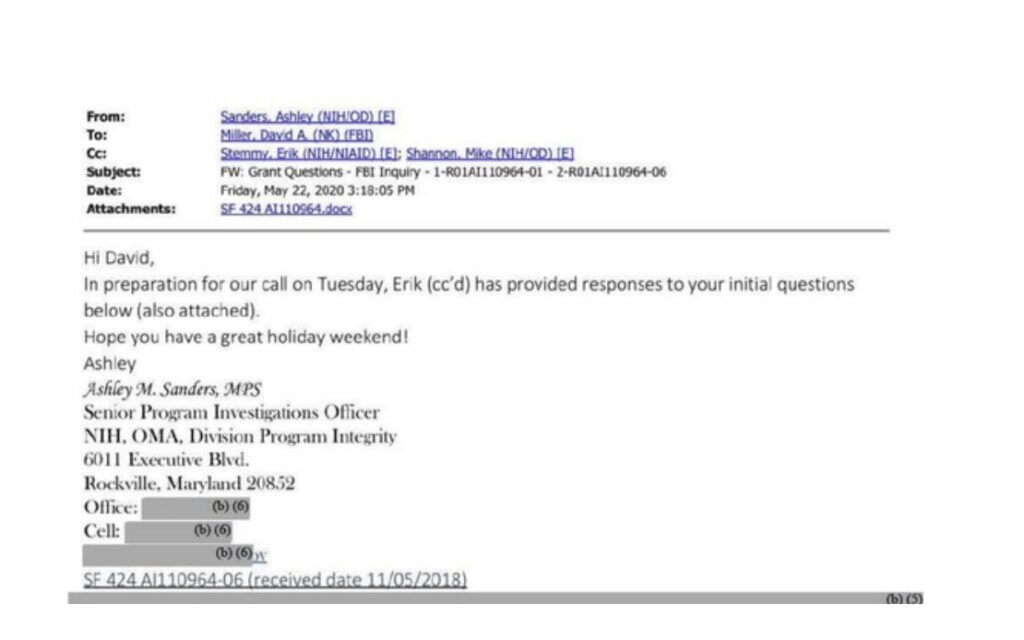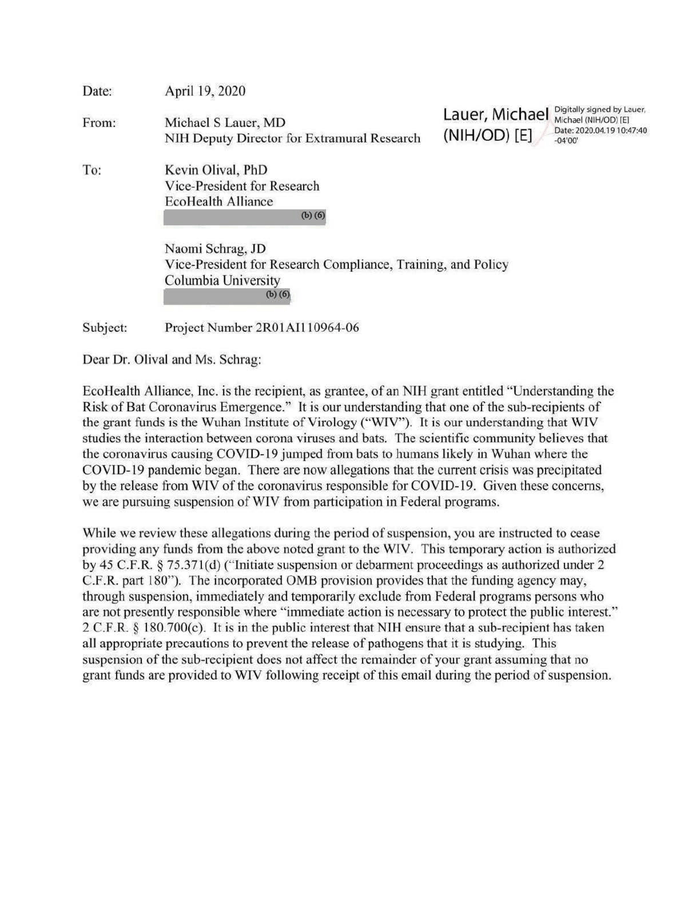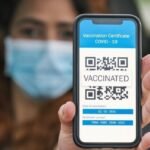
New records from the National Institutes of Health detail internal conversations involving EcoHealth Alliance’s research in Wuhan.
THE FBI SOUGHT National Institutes of Health grant documents covering bat coronavirus research in Wuhan in spring 2020, according to emails obtained by The Intercept. The emails, released through ongoing litigation between The Intercept and the NIH, detail internal NIH conversations involving the New York-based nonprofit EcoHealth Alliance, which collaborated with the Wuhan Institute of Virology on research. The emails also contain previously unreported requests the agency made of EcoHealth Alliance as a condition for restoring a grant funding its research. While unable to provide some of the information requested by the agency, Peter Daszak, EcoHealth’s besieged president, fought fiercely to save the grant.
The new information gives an unprecedented window into the high-profile tussle between EcoHealth Alliance and the NIH, and underscores the agency’s tenuous grasp of the biosafety protocols in place in its research projects, even with a project that has since come under scrutiny for a possible link to the Covid-19 pandemic.
“There doesn’t seem to be transparent and accessible record-keeping of incident reporting,” said Filippa Lentzos, co-director of the Centre for Science and Security Studies at King’s College London, after viewing some of the emails. “That is very worrying and underscores the need for an overhaul of biosafety oversight in the United States.”
The correspondence contains letters going back to April 2020, when Trump administration officials were blaming the Wuhan Institute of Virology, without sufficient evidence, for causing the pandemic. On April 17, President Donald Trump was asked in a press conference about the NIH grant to EcoHealth Alliance, under which the Chinese lab was a partner. He responded, “We will end that grant very quickly.” Two days later, Michael Lauer, NIH deputy director for extramural research, informed Daszak that the agency was suspending grant funds to the Wuhan Institute of Virology and instructed his group to cease providing grant money to the institute. On April 24, according to a letter included in the new communications, Lauer followed up with the news that the NIH was terminating the entire grant because it did not “align with the program goals and agency priorities.” He told EcoHealth Alliance officials that nearly $370,000 needed to be remitted back to the NIH’s National Institute of Allergy and Infectious Diseases, with their access to the remaining grant funds restricted “effective immediately.” (Politico reported the existence of the letter that same month, and Science later published an excerpt of it.)
The confrontation earned Daszak sympathy in the press and from other scientists. NIH officials, meanwhile, refuted the possibility of a lab origin, at least in public. It would later be revealed, however, that in February 2020 NIAID Director Anthony Fauci and then-NIH Director Francis Collins had privately consulted with prominent scientists who had seriously considered the possibility of a lab origin for the pandemic, and that two months later some leading researchers still believed a lab accident was possible. “Wondering if there is something the NIH can do to help put down this very destructive conspiracy,” Collins wrote in an email to Fauci in late April, in reference to a Fox News segment mentioning the lab-origin hypothesis. While a handful of biosafety experts had openly called for scrutinizing the NIH’s funding of EcoHealth Alliance, their entreaties were largely drowned out by political wrangling.
Trump officials had reportedly instructed U.S. intelligence agencies to search for evidence linking the Wuhan lab to the pandemic. Trump’s interest appeared to be scapegoating China, and officials in his administration homed in on sketchy evidence from Wuhan. But the emails obtained by The Intercept indicate that the FBI looked where biosafety experts had suggested they should: at EcoHealth Alliance’s NIH grant, though it’s unclear what prompted the FBI’s request for information. On May 22, 2020, Ashley Sanders, an officer with the NIH’s Office of Management Assessment, emailed FBI agent David Miller under the subject line “FW: Grant Questions – FBI Inquiry – 1-R01AI110964-01 – 2-R01AI110964-06”: the numbers the NIH had assigned to the grant and its renewal.
The correspondence suggests that NIH administrators provided Miller with detailed information about the grant. “In preparation for our call on Tuesday, Erik (cc’d) has provided responses to your initial questions below,” Sanders wrote, referring to Erik Stemmy, a program officer for the grant. The several pages of text that follow are redacted, except for the title of an attachment that includes the grant number and “SF424.” The SF 424 is a detailed NIH form that grant applicants must submit.

Experts have puzzled over whether the spy agencies gained access to EcoHealth Alliance’s grant documents. The DNI’s detailed report did not list grant documents or communications as a source of information, but the email about the inquiry now suggests that the FBI had previously obtained at least some internal information about the EcoHealth Alliance grant. The FBI declined to confirm the existence of the inquiry or otherwise comment.
Separately, in December 2020, the NIH cited a law enforcement exemption when denying a public records request from The Intercept for the EcoHealth Alliance grant documents. In a July 2021 hearing, a federal litigator explained the agency’s rationale: “At the time that they asserted the exemption, they were told and were under the impression there were ongoing investigations, law enforcement investigations, into what plaintiffs are alleging is a lab-leak hypothesis, what caused COVID,” said Assistant U.S. Attorney Alexander J. Hogan, referring to the NIH’s 2020 denial of The Intercept’s FOIA request. “And because of the implication of those investigations, they withheld these documents in full.”
The NIH released the bat coronavirus grant proposal to The Intercept in September 2021.
In a previously unpublished email sent in April 2021, Daszak told an NIH administrator that following a trip to China as part of the World Health Organization investigation, he had briefed the FBI and other intelligence agencies, as well as the National Security Council.
“Fishing for Material”
The newly released emails detail how EcoHealth Alliance fought back against the NIH’s termination of its grant. On May 22, 2020, lawyer Andrew Krinsky of the New York firm Tarter Krinsky & Drogin wrote to Lauer on behalf of EcoHealth Alliance. The lawyer said that NIAID had ranked the grant as “extremely high priority” when it was considered for renewal in mid-2019 and that EcoHealth Alliance had already agreed not to pass any more funding on to the Wuhan Institute of Virology.
While the NIH had said that “the decision not to award a grant, or to award a grant at a particular funding level, is at the discretion of the agency” and cited a clause that allowed it to terminate grants at will, Krinsky argued that the NIH didn’t have the legal right to cut off the funding and that according to the NIH’s own rules, there was “no rational basis to terminate” the grant.
The NIH, EcoHealth Alliance, and Tarter Krinsky & Drogin did not immediately respond to requests to comment.

In a July 2020 letter previously published by Vanity Fair, Lauer informed Daszak that the grant could be reinstated, but only if EcoHealth Alliance could meet seven conditions. Those included providing a sample of “the actual SARS-CoV-2 virus that WIV used to determine the viral sequence” and explaining apparently unusual activities at the Wuhan Institute of Virology, including roadblocks and diminished cellphone traffic, as well as the deletion of the online profile of a staffer at the lab named Huang Yanling.
The next month, the newly released emails reveal, the Tarter Krinsky & Drogin lawyers sent Lauer a detailed, seven-page rebuttal, demanding that the NIH reinstate the grant and immediately release the grant funds. The rebuttal suggested that EcoHealth Alliance and the Wuhan Institute of Virology were being unfairly scrutinized. Daszak echoed that idea in an interview with Nature that same month in which he called the NIH’s conditions “heinous.”
In October 2020, Lauer responded, arguing that the agency was within its rights to cut off the grant. “EcoHealth’s responses have not satisfied the NIH’s concerns that EcoHealth had failed to adequately monitor the compliance of its subrecipient, and that the subrecipient, WIV, had failed to comply with safety requirements,” Lauer wrote. Still, he offered the nonprofit one last chance to respond to its seven conditions — and added three more requests about the research in Wuhan. Among the new requests, which have not been previously reported, were descriptions of EcoHealth Alliance’s efforts to monitor risk at the Wuhan Institute of Virology and copies of all WIV biosafety reports from June 2014 through May 2019.

Six months later, in April 2021, Daszak wrote a lengthy letter to Lauer — this time signed by him and not his lawyers — addressing the 10 conditions. He offered to meet with Lauer “without legal counsel in a scientist-to-scientist conversation,” adding, “I look forward to your reply and hope that these will allow NIH to lift the suspension on funding so that we can continue our work to help protect our nation, indeed the global population, against future coronavirus pandemics.”
Yet, in a confiding email he sent to NIH officials and program officers later in April, he struck a less conciliatory tone. “I believe he’s fishing for material to support his earlier insinuation that EHA has done a poor job of monitoring biosafety,” Daszak wrote about Lauer in the email. Daszak interpreted the NIH official’s oversight efforts as a possible attempt to “provide cover so that he can say that we weren’t in compliance” and asked the NIH staffers to intervene.
reported that Stemmy was one of two agency employees who had allowed Daszak to draft a rule governing his group’s research. The recipient list also included several NIH section heads, including Emily Linde, the director of the NIH’s grant management program; Matthew Fenton, director of the agency’s division of extramural activities; and Emily Erbelding, director of the division of microbiology and infectious diseases.
“Any nudging you could give to Dr. Lauer would be welcome,” Daszak wrote to the group. He also nodded at recent developments. In the preceding weeks, dozens of scientists had signed open letters calling for a robust investigation of the origin of the pandemic. “I realize that the politics are not great right now, but this is science, not politics, and we have a job to do in trying to identify the next COVID-like disease, which is surely out there and probably already spilling over somewhere in S. China.”
As NIH-funded research in Wuhan was thrust into the spotlight in 2020, agency communications added to the sense that staffers had a flimsy grasp of the biosafety of both that project and others. In August 2020, a ProPublica article about a biosecurity lapse at a University of North Carolina at Chapel Hill lab sparked a flurry of emails at NIAID. Two days after the article was published, the communications show, staff scrambled to find information about the incident, in which a researcher was bitten by a mouse infected with a coronavirus and did not isolate afterward.
The NIAID employees appear to have had no record of it. “Was this February 2016 incident reported to NIAID and, if so, for which grant was this incident report filed?” a staffer in the NIH’s Office of Extramural Research and Policy Operations wrote to Stemmy, the NIH program officer, on August 19. She said her office had been asked to determine whether researchers at UNC followed proper biosafety procedures but “was unable to locate incident report memos in the grants folders” for five grants. The office had checked folders for two grants for research on coronaviruses at UNC, as well as the folder for the grant funding EcoHealth Alliance’s bat coronavirus research in Wuhan, possibly because the nonprofit worked closely with UNC. (UNC was a partner on the bat coronavirus grant, as well as on a new grant that NIH awarded to EcoHealth Alliance in August 2020.)
According to ProPublica, federal lab safety officials at the NIH had confirmed that the UNC incident involved types of “SARS-associated coronavirus” and the university had said in a statement that it had informed the proper oversight agencies. But several staffers looked for and were unable to find records of the risky episode. In one email, an administrator said that the incident had been reported to another division at the NIH but not to NIAID. He added that the program officer for the grant only knew about a more recent safety breach because a scientist had told him.
“That just seems to indicate that they do not have their house in order,” said Lentzos, the biosecurity researcher. “It underscores that as a funder, NIH is not the independent oversight body that you would want for this kind of research.”
“Great Personal Burden”
In his April 2021 letter to Lauer, Daszak said that he had traveled to China with a World Health Organization team in part to satisfy the NIH’s demands for more information. “I have made extensive efforts to satisfy NIH’s broad concerns,” Daszak wrote. “This includes serving as an expert on the WHO-China joint Mission on the Animal Origins of COVID-19, which involved 1 month on the ground in China (including 2 weeks locked in quarantine), at great personal burden and risk to me, to our organization, and to my family.”
While admitting that EcoHealth Alliance would not be able to meet some of the agency’s conditions, Daszak nevertheless appeared hopeful that the NIH might reassess its decision to terminate the funding. He again pushed back against some of the agency’s requests. Specifically, Daszak said that the questions about roadblocks near the Wuhan Institute of Virology and the deletion of Huang’s online presence — both of which had been focal points of online speculation — could be easily explained without any malfeasance.
“While many conspiracy theorists have suggested that the lack of a web presence of this person suggests some nefarious activity, there are dozens of unremarkable and routine reasons why a person may be removed from a web listing of employees or students,” he wrote of Huang. Similarly, Daszak noted, roadblocks and diminished cellphone traffic could be due to unremarkable road repair or other ordinary occurrences.
Daszak also had a different read on State Department cables from January 2018 that Lauer had asked about in his letter. The cables detailed a shortage of trained technicians for the Wuhan Institute of Virology’s BSL-4 laboratory, the first lab in China certified to deal with the most dangerous pathogens.
While in April 2020, Washington Post opinion columnist Josh Rogin had interpreted excerpts of the cables as evidence of safety and management weaknesses in the lab, Daszak disagreed. Indeed the full cables, which were released in July 2020, give a more complex picture, favorably describing research at the lab to which Daszak had contributed. “These do not in fact provide evidence of safety concerns at the laboratory,” he wrote to Lauer. “Neither do they convincingly imply safety issues.”
Lauer had also asked EcoHealth Alliance to arrange for an outside inspection of the Wuhan Institute of Virology. Daszak argued that cutting off the grant had made it virtually unthinkable that the Wuhan lab would assist with such requests. “This termination of a funded relationship with the institute makes it extraordinarily difficult and more likely impossible to provide the information requested,” Daszak wrote to Lauer. International politics made the situation worse, as he noted in an explanation of why EcoHealth Alliance was unable to procure a sample of the actual SARS-CoV-2 virus that the Wuhan Institute of Virology had used to determine its viral sequence.
“During the last 16 months, there has been a series of vitriolic attacks from the US Government accusing China of bioengineering and releasing SARS-CoV-2 or of otherwise allowing COVID to become pandemic,” he wrote to Lauer. “Given these attacks, and WIV’s status as a government entity, it seems to us incredulous that any request, particularly without scientific rationale, from a US non-profit to a Chinese Government laboratory for an active sample of a pathogenic human virus would likely be successful.”
Daszak also cited strained international relations when explaining why he couldn’t produce copies of the WIV biosafety reports, which might have provided insight into what precautions the lab had taken in its work on bat coronaviruses and whether any breaches of protocol had occurred.
“Some of [NIH’s] demands were a little impractical,” said Alina Chan, co-author of the book “Viral: The Search for the Origin of Covid-19.” “How would EcoHealth Alliance be able to obtain information about the missing staffer?” But Daszak should have been able to provide lab safety records, which are “much more significant,” she said.
To Lauer, Daszak noted that the media attention and resultant public curiosity about the work EcoHealth Alliance conducted in Wuhan had cost him personally. “This type of harassment has accelerated to the point that personal security guards are now stationed at my home address, where I have also had to install invasive equipment and set up procedures to protect my family against expected violent attacks,” Daszak wrote. “Additionally, I now meet regularly with FBI agents and others at my home to monitor these threats.” As he did in communications The Intercept published in December, Daszak referred to a letter containing white powder that he had received at his home. Local news media reported the incident at the time.
Denying Document Requests
Meanwhile, EcoHealth Alliance was also pushing on another front. In January 2021, Matthew Torsiello, one of its lawyers, emailed Lauren Bartok, an information specialist in the NIH’s Freedom of Information Act Office, to request that a FOIA request for EcoHealth Alliance’s grant documents be denied. Torsiello asked that the request, which was made by a member of the public through the transparency organization MuckRock, be denied because the grant termination was under appeal and because “a law enforcement investigation concerning WIV remains ongoing.” Torsiello explained that his law firm had previously asked for the NIH to deny a request for EcoHealth Alliance grant documents made in 2020, also by a member of the public.
The lawyer’s email went on to make a tenuous argument. “As demonstrated by the recent attack on the US Capital [sic] fueled by disinformation and conspiracy theories, the need to protect the privacy of EcoHealth Alliance’s employees and affiliates is more important than ever.” The email did not offer further explanation, but Daszak had previously argued to the press and in the pages of the medical journal The Lancet that the notion that the pandemic could have a lab origin was a conspiracy theory.

The day after Torsiello sent his email, another NIH FOIA officer wrote an email to an undisclosed recipient rejecting the lawyer’s arguments for withholding the records. The officer noted that “there are no pending investigations” into the Wuhan Institute of Virology. Nine months later, the NIH FOIA office closed the public records request, pointing the requester to documents that the NIH had released online.
While EcoHealth Alliance’s intervention in the FOIA request is not unusual, agencies are required by law to independently determine whether records should be disclosed, said Gunita Singh, an attorney for the Reporters Committee for Freedom of the Press. “Agencies subject to FOIA are obligated to serve the public’s interest in learning about government functions,” she wrote in an email. “They cannot operate at the behest of private parties.”




